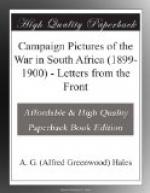During the many stormy scenes which preceded the actual declaration of war Louis Botha proved that he possessed the coolest and most level head in the Volksraad. He opposed the war, and, with prophetic eye, foresaw the awful devastation of his country which would follow in the footsteps of the British army. But when the time came, and his country was irretrievably pledged to war, he was not the man to hang back. He was one of those who had much to lose and little indeed to gain by taking up arms against us, for, by honest industry, he had become a wealthy farmer and stockbreeder. At the first call to arms he threw aside his senatorial duties, and took up his rifle, rejoining his old commando at Vryheid as commandant under General Lucas Meyer. It is said that at the battle of Dundee General Meyer, feeling convinced that the God of Battles had decided against him and his forces, decided to surrender to the British, but Louis Botha fiercely combated his general’s decision, and point-blank refused to throw down his arms or counsel his men to do so. What followed all the world knows, and Botha went up very high in the estimation of the better class of fighting burghers. At the Tugela, before the first big battle took place, General Meyer was taken ill, and had to retire to Pretoria, and Louis Botha was then elected assistant-general, and the planning of the battle was left entirely to him.
It was a terribly responsible position to place so young a man in, for he was face to face with the then Commander-in-Chief of the British army, Sir Redvers Buller, a general of dauntless determination and undoubted ability. Experience, men, and all the munitions of war were in favour of the British general; but the awful nature of the country was upon the side of the newly fledged Boer leader, and he made terrible use of it. The day of Colenso, when Sir Redvers Buller received his first decisive check, will not




